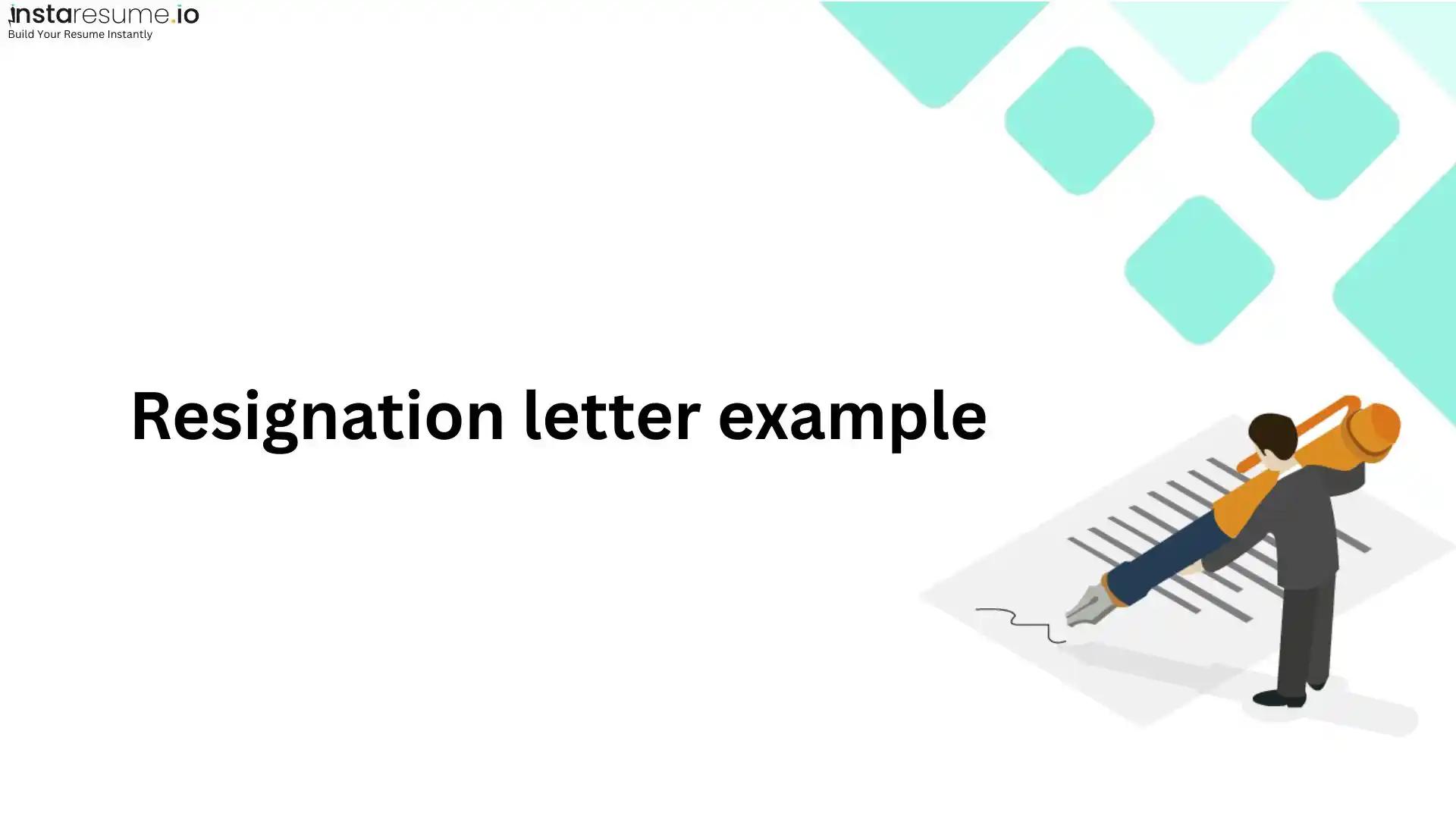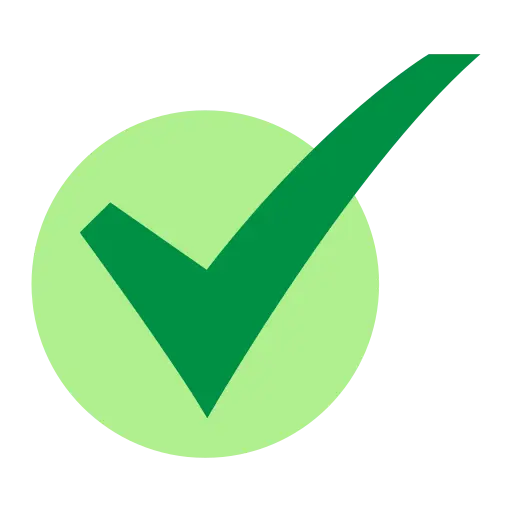Resignation Letter Example
Trust Score: 4.8
362 reviews

Table of Contents
Introduction
Resigning from a job can be an emotional experience—but writing a professional resignation letter doesn’t have to be. Whether you're moving on to a better opportunity, pursuing further education, relocating, or stepping back for personal reasons, the way you communicate your departure speaks volumes about your professionalism.
A resignation letter example that’s clear, polite, and properly formatted can help you resign gracefully. More importantly, it ensures you don’t burn bridges. In this comprehensive guide, you'll find a practical example of a resignation letter, expert tips on how to write your own, and everything you should—and shouldn’t—include before hitting "send."
A Professional Resignation Letter Example That Works in Most Situations
Example 1: Resignation Letter for Personal Reasons
[Your Full Name]
[Your Address]
[City, State, ZIP Code]
[Email Address]
[Phone Number]
[Date]
[Manager’s Name]
[Company Name]
[Company Address]
Subject: Resignation Due to Personal Reasons
Dear [Manager’s Name],
I am writing to formally resign from my position as [Job Title] at [Company Name], effective [Last Working Day].
Due to unforeseen personal circumstances that require my immediate attention, I have decided to step away from my current role. Please know that this decision was not made lightly, as I have genuinely enjoyed working here and appreciate all the support and guidance I’ve received.
I am committed to making this transition as smooth as possible and will assist in handing over my responsibilities during the notice period.
Thank you once again for the opportunity to be a part of [Company Name]. I value everything I’ve learned and experienced here and hope to stay in touch.
Sincerely,
[Your Full Name]
Example 2: Resignation Letter for a New Job Opportunity
[Your Full Name]
[Your Address]
[City, State, ZIP Code]
[Email Address]
[Phone Number]
[Date]
[Manager’s Name]
[Company Name]
[Company Address]
Subject: Resignation Letter – [Your Position]
Dear [Manager’s Name],
Please accept this letter as formal notice of my resignation from my position as [Your Position] at [Company Name], effective [Last Working Day].
I have recently accepted a new opportunity that aligns more closely with my long-term career goals. I want to express my sincere appreciation for the valuable experiences and support I’ve received during my time here. I’ve learned so much and will carry these lessons forward.
I am committed to ensuring a seamless transition and am happy to assist in training my replacement or wrapping up any open tasks.
Thank you again for the opportunity. I look forward to staying in touch and wish you and the team continued success.
Warm regards,
[Your Full Name]
Example 3: Immediate Resignation Due to Health Reasons
[Your Full Name]
[Your Address]
[City, State, ZIP Code]
[Email Address]
[Phone Number]
[Date]
[Manager’s Name]
[Company Name]
[Company Address]
Subject: Immediate Resignation – Health Reasons
Dear [Manager’s Name],
I am writing to inform you of my decision to resign from my position at [Company Name], effective immediately, due to health-related concerns that require my full attention and rest.
I deeply regret the short notice and any inconvenience it may cause, but I assure you this decision is necessary for my well-being. I have enjoyed my time at [Company Name] and appreciate the opportunities to grow both personally and professionally.
If there’s anything I can do remotely to assist during the transition, please let me know. I am grateful for your understanding and support during this time.
Sincerely,
[Your Full Name]
How to Write a Simple Resignation Letter That Reflects Professionalism
If you want to write your own resignation letter from scratch, keep the following structure in mind:
Opening statement with resignation intent
Clearly mention that you're resigning and state your job title and intended last working day.
Brief explanation (optional)
A line or two explaining why you’re leaving—like pursuing a new opportunity or moving to a new city—can add clarity but isn’t mandatory.
Gratitude for the opportunity
Always thank your manager or team for the experience, even if the journey wasn’t perfect.
Offer to assist in the transition
Help train a new hire or provide documentation—this shows you’re leaving responsibly.
Closing and signature
End with well wishes and a polite sign-off using “Sincerely” or “Best regards.”
This structure applies to most industries, whether you're writing a resignation letter for a corporate job, a teaching position, or a freelance contract.
Common Mistakes People Make When Writing a Resignation Letter
Even with the right format, many professionals make small yet costly mistakes in their resignation letters. Here's what to avoid if you want to resign professionally and leave on good terms:
1. Being Too Emotional or Negative
It’s natural to feel frustrated if you’re leaving due to a toxic work environment. However, your resignation letter is not the place to vent. Negative comments can damage your reputation and close future doors.
Instead: Keep it diplomatic. Even if your experience wasn’t great, thank the company for the opportunity or mention the skills you gained.
2. Forgetting to Include the Final Working Date
Many people overlook this key detail. Not specifying your last working day creates confusion for HR and your manager and can delay processing your departure.
Pro Tip: If you're unsure how much notice to give, check your employment contract. A two-week notice is standard, but some roles may require longer.
3. Oversharing Personal Reasons
You’re not obligated to explain every detail of why you're leaving. Writing a resignation letter due to personal reasons? Keep it general and respectful.
For example: “Due to personal circumstances, I’ve made the decision to step down from my position.”
4. Not Proofreading
Grammatical mistakes or awkward phrasing can make even the most well-intentioned letter look careless. Take the time to proofread or use tools like Grammarly.
5. Using an Informal Tone
This isn’t a text message. Avoid using casual language, emojis, or jokes—even if you’re on friendly terms with your manager.
Remember: This is a formal business communication. Use a polite, professional tone throughout.
Final Tips Before You Submit Your Resignation Letter
If you're feeling anxious about submitting your resignation letter, that’s completely normal. Here are some expert-backed tips to help you manage the process with professionalism:
Schedule a Private Conversation
Before handing in your letter, schedule a one-on-one meeting with your manager. Verbally share your decision first. Your letter should serve as written confirmation, not a surprise announcement.
Email vs. Printed Copy
If you work remotely, it’s fine to email your resignation letter. Just save it as a PDF and attach it with a brief email. If you’re working in-office, handing over a printed and signed letter is a nice touch.
Keep a Copy for Yourself
Save a digital copy of your resignation letter and any relevant correspondence. It’s helpful for reference or if HR ever misplaces your original letter.
Be Gracious in Your Exit Interviews
If your employer conducts an exit interview, stay honest but professional. Don’t complain, blame, or badmouth anyone—it can harm your reputation down the road.
Leave Things Better Than You Found Them
Use your notice period to finish tasks, clean up files, document key processes, and help onboard a new hire if possible. Leaving your role in good shape will speak volumes about your work ethic.
Related: How to write a two week notice letter
How to write a resignation letter
Conclusion: Resign with Confidence and Class
A well-crafted resignation letter is more than just a requirement—it’s a symbol of your professionalism, maturity, and respect for your workplace. When written thoughtfully, it allows you to resign without burning bridges and leaves a lasting impression of integrity.
Whether you're looking for a resignation letter sample for personal reasons, a simple resignation letter with a notice period, or just want to understand how to resign from a job professionally, the approach remains the same:
✅ Be clear,
✅ Be kind,
✅ Be constructive,
✅ And always be professional.
Your resignation letter marks the end of one chapter and the beginning of another. Write it well, and it could open doors far beyond your current role.
FAQs
1. How much notice should I give when resigning from a job?
A two-week notice is standard, but check your employment contract—some roles require more. Giving proper notice shows professionalism and allows for a smoother handover.
2. Do I need to mention the reason for resigning in the letter?
No, it’s optional. You can mention a general reason like "personal growth" or "relocation," but it’s perfectly fine to keep it brief or leave it out entirely.
3. Can I send a resignation letter by email?
Yes. Email is acceptable, especially in remote or hybrid jobs. Attach the letter as a PDF and use a clear subject line like “Resignation – [Your Name]”.
4. Is a formal resignation letter still necessary?
Absolutely. Even if you’ve spoken to your manager, a written letter documents your decision and protects both you and the employer legally and professionally.
5. Should I mention any negative experiences in my letter?
No. Keep your letter positive or neutral. Avoid venting or criticizing—use the exit interview for honest feedback if necessary.
6. Can I use a resignation letter template for any job?
Yes. A good template works across roles—whether you're a teacher, nurse, intern, or software engineer. Just adjust the tone and context.
7. Is it okay to resign immediately without notice?
Only if absolutely necessary—such as for health, emergencies, or safety concerns. Be polite and explain the urgency, but know it may affect references.
8. Can I take back my resignation later?
Sometimes. If your employer hasn’t processed your exit or hired a replacement, they may accept a withdrawal. Act quickly and be respectful.
9. What tone should my resignation letter have?
Keep it formal, polite, and professional. Avoid slang or emotional language. Even a short resignation letter should reflect maturity and respect.
10. Can a badly written resignation letter affect my references?
Yes. Your letter is your last impression. A thoughtful, professional message increases the chances of a good reference or future opportunity.






